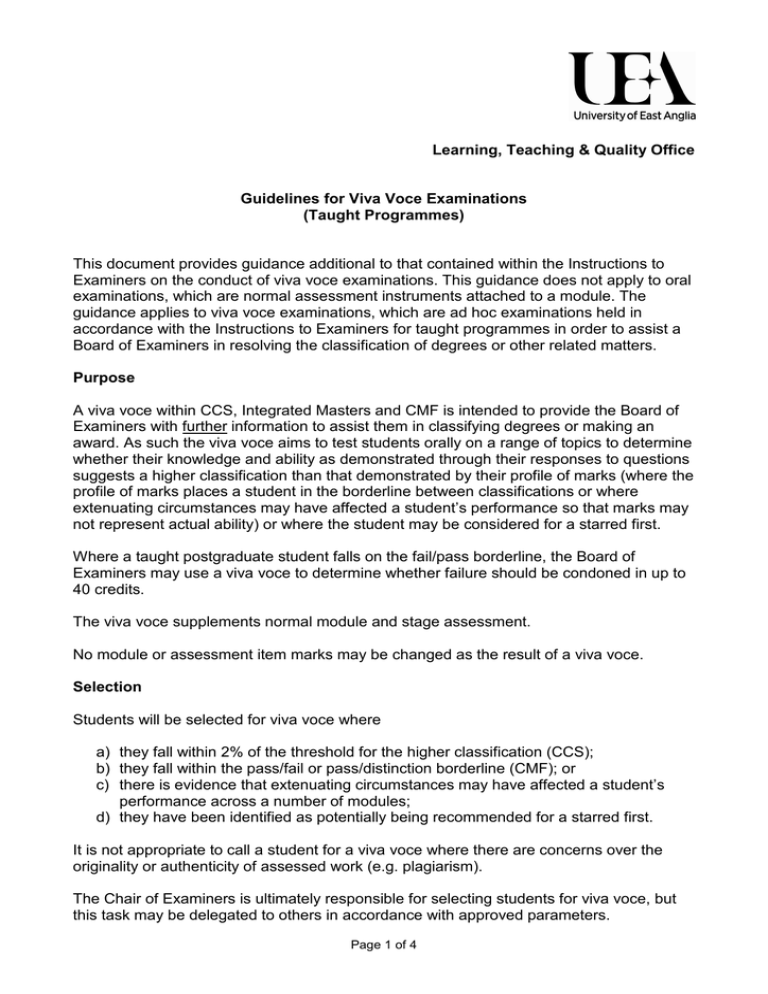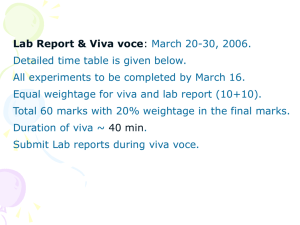Guidelines for Viva Voce Examinations
advertisement

Learning, Teaching & Quality Office Guidelines for Viva Voce Examinations (Taught Programmes) This document provides guidance additional to that contained within the Instructions to Examiners on the conduct of viva voce examinations. This guidance does not apply to oral examinations, which are normal assessment instruments attached to a module. The guidance applies to viva voce examinations, which are ad hoc examinations held in accordance with the Instructions to Examiners for taught programmes in order to assist a Board of Examiners in resolving the classification of degrees or other related matters. Purpose A viva voce within CCS, Integrated Masters and CMF is intended to provide the Board of Examiners with further information to assist them in classifying degrees or making an award. As such the viva voce aims to test students orally on a range of topics to determine whether their knowledge and ability as demonstrated through their responses to questions suggests a higher classification than that demonstrated by their profile of marks (where the profile of marks places a student in the borderline between classifications or where extenuating circumstances may have affected a student’s performance so that marks may not represent actual ability) or where the student may be considered for a starred first. Where a taught postgraduate student falls on the fail/pass borderline, the Board of Examiners may use a viva voce to determine whether failure should be condoned in up to 40 credits. The viva voce supplements normal module and stage assessment. No module or assessment item marks may be changed as the result of a viva voce. Selection Students will be selected for viva voce where a) they fall within 2% of the threshold for the higher classification (CCS); b) they fall within the pass/fail or pass/distinction borderline (CMF); or c) there is evidence that extenuating circumstances may have affected a student’s performance across a number of modules; d) they have been identified as potentially being recommended for a starred first. It is not appropriate to call a student for a viva voce where there are concerns over the originality or authenticity of assessed work (e.g. plagiarism). The Chair of Examiners is ultimately responsible for selecting students for viva voce, but this task may be delegated to others in accordance with approved parameters. Page 1 of 4 As the viva voce represents a further opportunity for a student to demonstrate their academic ability there is no requirement for students to attend (although it is clearly in their interests to do so) and no penalty shall be applied should they be unable or unwilling to attend. Notification Whilst the Instructions to Examiners for CCS, Integrated Masters and CMF provide all Schools with the option of calling a student to a viva voce, it is assumed that they will only be used where it is custom and practice to do so and not on an ad hoc basis to respond to a particular set of circumstances. It is therefore anticipated that Schools will have an established procedure and timetable for selecting students for viva voce and for notifying them in reasonable time. In some Schools this may take the form of the notification of a long list of those who may be called to viva, which is later refined once clearer assessment information is available. Students who are on the long list will be notified at the earliest opportunity, which for undergraduates should be during normal semester time (i.e. not during a vacation). Students shall be given at least 72 hours notice of a viva voce. Notification should be by phone if possible. Students shall not be informed of their provisional aggregate mark / provisional classification before the viva. Scope A viva voce examination may focus on a) the content of the course as a whole (i.e. the subject matter of all modules enrolled on by a student); b) the subject matter of (a) module(s) where a student’s performance has been weak or which has been affected by extenuating circumstances; c) the subject matter of a dissertation or project module where this is viewed as being a particularly significant piece of assessed work. A student will not be advised in advance of the viva voce which of the above will be the focus of the viva voce and should prepare themselves as comprehensively as possible. d) where a viva voce has been called as a result of extenuating circumstances formally reported to the Board of Examiners in accordance with the Regulations and Instructions to Examiners, the examiners may additionally take the opportunity to explore briefly with the student the extent to which the reported extenuating circumstances have impacted upon their academic performance. Any such discussion must be in addition to the academic matters listed above, which should form the majority of the discussion. It is not appropriate for examiners to seek further information on the extenuating circumstances per se and must restrict themselves to exploring the impact of the circumstances on the student’s studies and performance. The examiners must make it clear to the student that the student can decline to answer questions relating to extenuating circumstances and should cease the line of questioning if the student appears to be distressed. Page 2 of 4 Where a viva voce examination is likely to touch upon the impact of extenuating circumstances in addition to academic matters, the student should be advised of this in advance. The viva voce should not be used as an opportunity for the external examiner to meet with students and discuss the course in general (although the external examiner will of course gain an additional impression of the course from the process). Other opportunities should be provided for interaction between external examiners and students if the external examiner sees this as desirable. Examiners The Instructions to Examiners for CCS, Integrated Masters and CMF state that a viva voce must be conducted by at least two examiners, one of whom shall be an external examiner and one of whom shall be an internal examiner. Students should be informed of the names of the examiners conducting the viva voce at the same time as they are invited to attend. If a student has a concern about the examiners conducting the viva voce this should be discussed immediately with the student’s Academic Adviser. Students are not permitted to request a change of examiner, but Chairs of Examiners are asked to be sensitive to potential conflicts of interest when nominating examiners to conduct viva voce examinations. The examiners conducting the viva voce will have had the opportunity to review the student’s assessed work prior to the viva voce. Format As noted above, the viva voce supplements the formal assessment of the course and provides an opportunity for the student to demonstrate their academic ability. The examiners will question the student individually on any aspect of the course as outlined in “Scope” above. As the aim of the viva voce is to determine whether the student has met the criteria for a higher classification, questioning should focus upon identifying evidence of higher academic ability (e.g. evidence of an ability to evaluate, analyse and synthesise information rather than recall detailed facts). A viva voce will normally last for a maximum of 30 minutes. Recommendation to the Board As stated in the Instructions to Examiners, the purpose of the viva voce examination is to assist the Board of Examiners in reaching a decision on classification or award of a degree. The outcomes of the viva voce are an additional piece of information, to be considered by the Board alongside other information such as the profile of marks and any evidence relating to extenuating circumstances. Whilst the views of the examiners conducting the viva voce will be particularly influential due to the nature and purpose of the viva voce, the examiners are only making recommendations to the Board of Examiners, which remains free to use its discretion when making a recommendation to Senate on the classification of a degree. Page 3 of 4 As a result of the viva voce examination, the examiners may recommend to the Board of Examiners a) that the student’s classification remains as suggested by the aggregate, or b) that the student’s classification should be raised to the next class. As specified in the Instructions to Examiners, no student’s classification may be lowered as a result of a viva voce examination. Alternative Arrangements There may be circumstances where it is impractical for a student to attend a viva voce, for example where extenuating circumstances prevent them from doing so or where a taught postgraduate has returned home by the time of the Board. Where practical to do so alternative arrangements may be made to ensure that such students have the same opportunity to demonstrate academic achievement at a higher level. Alternative arrangements may include teleconferencing or videoconferencing, where facilities exist. Information to Students Where the viva voce forms a normal part of the assessment process, information on the purpose and timing of the process should be published to (Final year) students, for example through the student handbook, an information sheet or a Blackboard page. (An example is attached as Appendix 1 for illustration.) When students are invited to attend for viva voce examination they should be told the location and time of the examination, as well as the names of those conducting the examination. The notification to students may include the suggestion that they consult with their Academic Adviser for guidance on the process. Feedback to Students Students will not normally be provided with feedback on their performance in a viva voce examination. As part of the informal resolution of a student’s concerns about classification (prior to a formal appeal) limited information may be shared with a student about the recommendations of the examiners conducting a viva voce examination. A student may be provided with a summary of issues considered as part of the classification of their degree, including the conclusions and recommendations of the examiners conducting a viva voce, as part of the response to an Academic Appeal (Stage 1 or Stage 2). Approved by the Learning and Teaching Committee of Senate – 3 February 2010. Page 4 of 4
